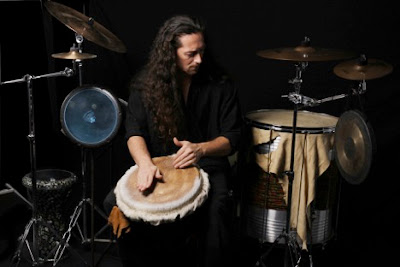I've always loved rhythm -
but not because it connects me to the "heartbeat of the earth,” or the
"cycles of life," or the "rhythms of the cosmos." These
cliché metaphors seem to suggest that musical rhythm is a microcosm of a more
profound reality. I love rhythm because in music, I have found a pulsing,
life-giving universe of infinite exploration that does not need any
justification beyond itself. Musical rhythm takes advantage of a unique human
capacity - that of measuring time with great precision through the senses. As
one of the legs of the trinity (along with melody and harmony), rhythm is a
fundamental aspect of what makes music a universal human language. Rhythm is
math expressed with a passion that compels the body to move and the soul to
awaken. Rhythm has been the vehicle for the visions of shamans, the engine of
trance and ecstasy in religious rituals and ceremonies, and a guide toward
personal evolution for musicians around the world and throughout history.
I compose, produce, arrange,
and perform rhythmically-driven contemporary world music. As a percussionist,
my influences include contemporary and traditional music from the African
diaspora, the Middle-East, Eastern Europe, India, and anywhere else I can
encounter weird and wonderful sounds.
As a composer, I sometimes think of rhythm as a matrix or tapestry, where the horizontal threads are the flow of time for each sound and the vertical threads are the sounds or silences.
As a composer, I sometimes think of rhythm as a matrix or tapestry, where the horizontal threads are the flow of time for each sound and the vertical threads are the sounds or silences.
Through the array of vertical
and horizontal threads, a sonic image that is greater than the sum of its parts
comes into focus. For me, a well crafted rhythmic composition is one that is
musical at every level of resolution. The rhythmic relationship between any
combination of rhythmic "identities" is intentional and tells a story
of tension and resolution, but each element also plays a meaningful part in the
whole.
If I were satisfied with the purely intellectual challenges and rewards of creating complex structures, I might have chosen architecture as my medium (though I'm not suggesting architecture can't also be sensual) - but music is not just cold lines, angles, and mathematical precision. It is also heat, curves, color, sweat, and passion. Fundamental to rhythmic precision is the ability to embody rhythm - literally for rhythm to be in the body - not just in the limbs but in the core. Music must be physically felt before it can be played. Otherwise, it is merely sound.
As a performer, I get to take a wild ride through time. At its best, performance of deep, rhythmic music is an opportunity to experience each passing moment as both vast and ephemeral. Each moment requires complete commitment and complete surrender. As an improviser, I get to pull on the threads of the rhythmic tapestry. Through sound and silence, I get to illuminate the subtle colors and shapes in the composition so that each performance can offer a unique perspective on what has been written.
Renowned psychologist Mihaly
Csikszentmihalyi described optimal experience, or what he calls
"flow," as "being completely involved in an activity for its own
sake. The ego falls away. Time flies. Every action, movement, and thought
follows inevitably from the previous one ... Your whole being is involved, and
you're using your skills to the utmost." The fact that his description is
remarkably similar to that of mystical experiences is, I think, not a
coincidence.
Music provides an experience
of unity between mind and body, thought and feeling, commitment and surrender.
Through the creative process, I am able to be the most complete version of
myself and yet not be bound to a sense of self at all. The power of music and
rhythm is in its ability to resolve
these paradoxes and contradictions. On a spiritual level, like so many
musicians before me, I have found music to be meditation for my otherwise
restless mind, and an aperture through which I can experience a reality that is
deeper and more profound than the one I more often inhabit.
This is Week 30 of 52 Artists in 52 Weeks. Thank
you for reading and sharing Julian’s story today. To connect with him, see
videos of performances and hear his music, please visit the links below.
YouTube:






No comments:
Post a Comment